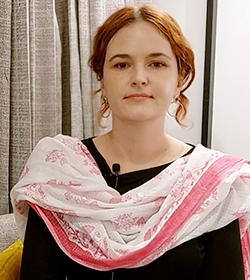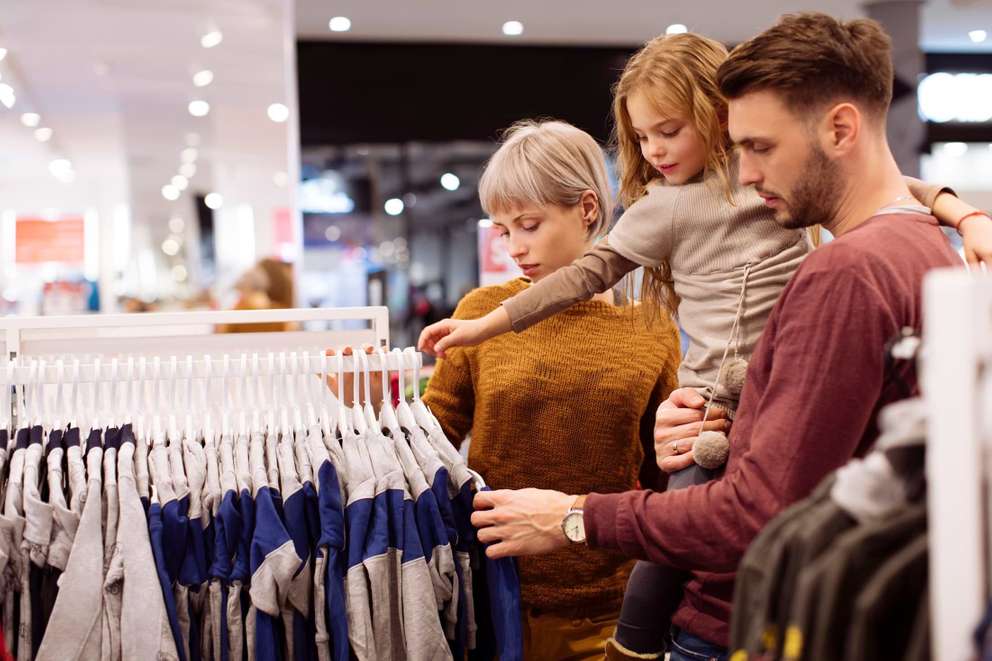3 Questions for
Ashley Saxby | Asia Floor Wage Alliance (AFWA)
Ashley Saxby is the gender justice coordinator and the Southeast Asia coordinator of Asia Floor Wage Alliance (AFWA). AFWA is a a labour-led global labour and social alliance across garment-producing countries in Asia and consumer regions of USA and Europe, with over 50 members in 7 different garment production countries in Asia. AFWA supports worker struggles for living wages and aims to end and prevent gender-based violence and harassment.

1. The Asia Floor Wage Alliance advocates for living wages. Why does this cause need a transnational alliance?
Fashion brands based in the West or so-called developed countries really have all the power in global supply chains. They outsource production to less developed countries or countries where workers basically receive poverty wages such as in many countries in South and Southeast Asia. Thus, brands have so much power on one end, and they price their purchase orders very low through coercive means, essentially the threat to take their business out and move it elsewhere, so they approach the whole region with an average acceptable cost. They are creating this fiercely competitive environment where the cost of labour is basically artificially suppressed. All of this happens so brands can maximise their profits while the profit share that goes to the suppliers is much smaller and, of course, that share that goes to workers is just a pittance. So basically, because these brands have this regional strategy, keeping the average cost of production low across the region through the threat of relocation, we really need the bargaining power of workers to also have this regional level, to have a regional strategy to compete with the regional strategy of brands. If we only focus on country level organising, then that leads to a division of workers within the region by country.
2. Your model for living wages focusses on women. Why is this necessary from AFWA’s point of view?
Of course, women make up the majority of garment workforces, somewhere between 70 and 80%, and a large portion of these women are supporting their entire family. And we know that women’s labour is historically paid much less than men’s labour, because their work is undervalued and because of the false idea that men are the main bread winners and that women’s income can just be supplementary. Which we know isn’t true. Many women garment workers are the single earner in their households. And, at the same time, women tend to have the double burden or the unpaid responsibility of doing the domestic work and care and child work. Work that is usually done without pay or could sometimes be purchased on the market like hiring a domestic helper or childcare giver. Thus, the Asia Floor Wage is a living wage figure that includes a family’s actual expenses for care work or the true cost of women workers family expenses.
3. Another focus of your work is the prevention of violence against women. What approaches does AFWA take to combat said issue?
We always say that solving the problem of gender-based violence and harassment goes hand in hand with solving the problem of freedom of association. Women are often prevented from unionising and becoming union leaders because women who face harassment and violence daily cannot be expected to join unions under the conditions of fear and abuse. So, we really have to tackle the problem of gender-based violence and harassment in order for women to join and form unions. AFWA’s approach, which we call the safe circle approach, is something that was conceived of by women leaders from garment unions. This really aims to build women’s leadership on production lines inside factories and it also integrates unionisation as a part of that process. We’ve seen tremendous success in this especially with the landmark Dindigul Agreement which is an enforceable grand agreement that was won by Asia Floor Wage Alliance, the labour union TTCU, GLJILRF (Global Labour Justice – International Labour Rights Forum) and signed with fashion brands H&M, GAP and PVH, and garment supplier Eastman Exports. This really created an independent grievance mechanism that is led and trusted by women workers. It includes union management dialog to resolve issues before they really escalate, and it has the backing of fashion brands who are obligated through the agreement to use their leverage to support this union driven mechanism. We’ve seen extraordinary results in the first year and are confident that this is a really promising way forward to actually transform the industry.

